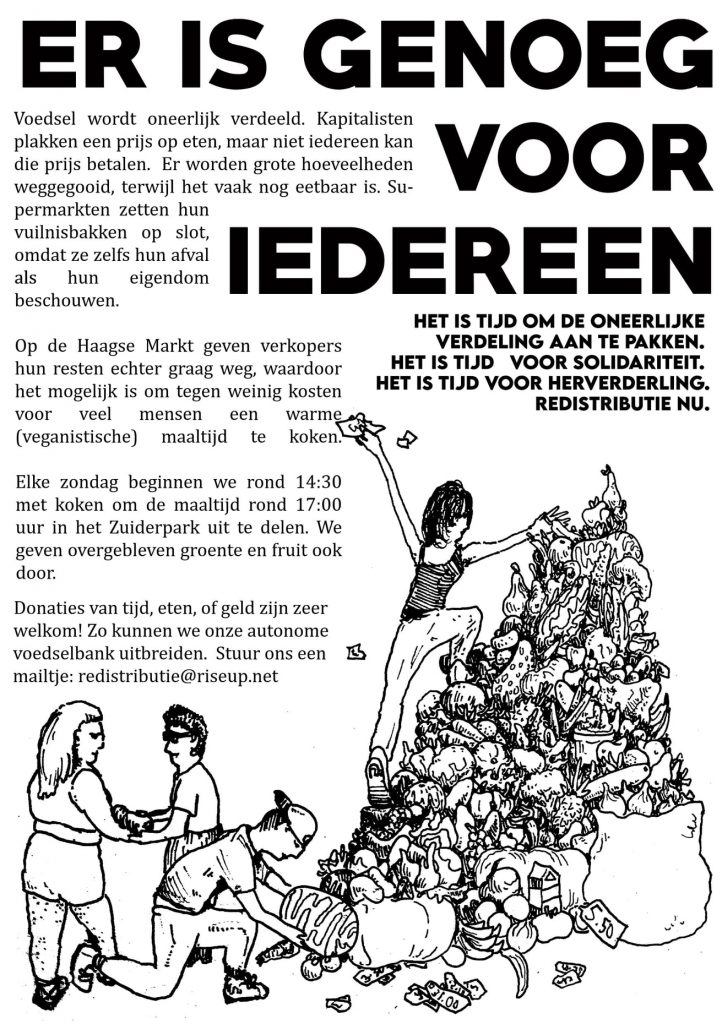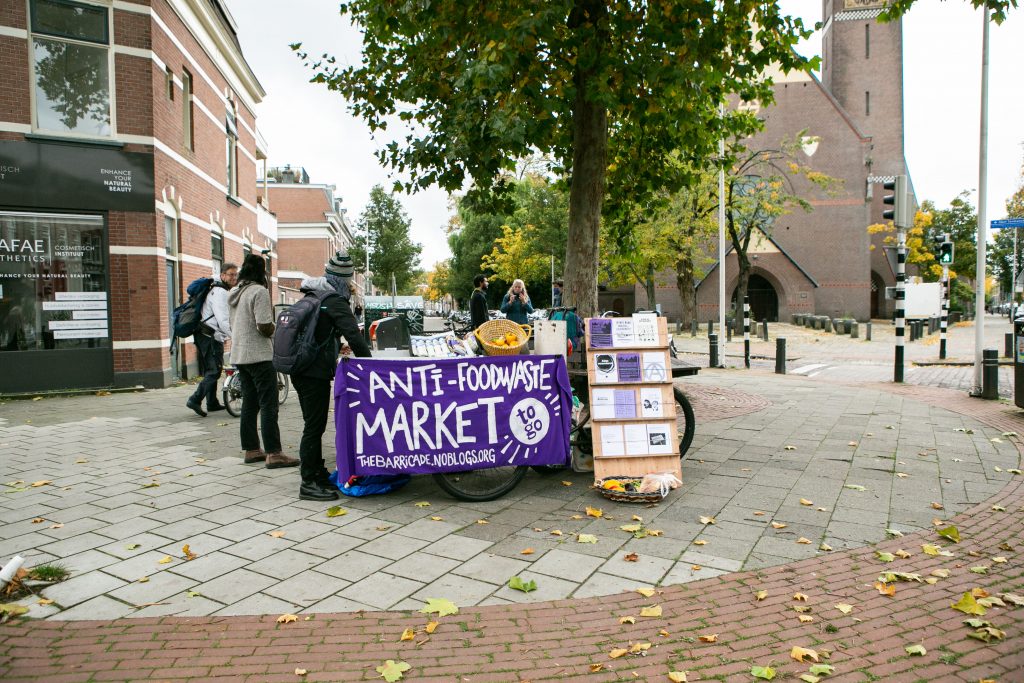
Barricade To Go
The Reflection Table on People’s Kitchens during Covid (called with this introduction text) took place online on October 18th. It was a really nice moment to discuss our practices and experience with quite some people, even if we had to do it from distance. Sharing experiences and practical advises on our struggles and confronting with the problems we face in this very specific time, was something quite needed. It was especially empowering to hear that more people are doing similar things and still pushing forth anti-capitalist practices in various cities despite the difficulties, the need to create spaces and conditions that are safe for people, and the government measures. We were joined in the conversation by people from Taste Before You Waste Utrecht, Joe’s Garage (Amsterdam), RATS (Rotterdam) and Redistributie (Den Haag).
For this report, we tried to summarize what was discussed among various members of the kitchens in various topics. If you want to watch the full recording you can watch it at this link.
What were you doing before the COVID-19 pandemic and what are you doing now?
We as The Barricade had been hosting our Barricade Sunday every week until March. There, we were combining the activities of running a library and hosting regularly political events with a VoKu. We stopped with our regular activities after COVID and started doing a lot of different things during the months. We were involved in the Solidarity Kitchen project and trying to do many other things next to that. Lately, after trying different ways to host events outside, we have been doing Free Veggies Market around town, going with a Bakfiets in various spots and giving away for free soup, zines and veggies.
Taste Before You Waste Utrecht was hosting a VoKu every Saturday evening. Beside that, they were also doing regular veggies pick-ups at small greengrocers to bring them at shelters for undocumented people and at the Free Shop (Weggeefwinkel Utrecht).
While their pick-ups activities could still go on during COVID, their VoKu inside had to stop. They’ve been also involved in the Solidarity Kitchen project. Lately they’ve started to cook again, they served outside a couple of times, now they mostly bring the meals to the Free Shop Solidarity Fridge, which is a fridge outside of the Free Shop that is accessible to everybody 24/7 to drop or take food from.
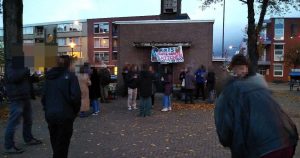
RATS’ Anti Waste Dinner
RATS was hosting a Voku every Thursday evening and organizing various political and cultural events after dinner. After a short period of inactivity at the start of the pandemic, they managed to start the Voku again: they were still cooking inside, then putting everything in a shoppingcart to go eat with a group of people at a park nearby. During these evenings outside, they also hosted small concerts from time to time. With the start of the colder season, they are now serving food outside for people to take.
Redistributie started being active recently, around February of this year in Den Haag. Since the beginning of their activity, they have been collecting food at the Haagse markt, cooking it inside and then bringing the prepared meals around in a big park (also a park where a lot of homeless people hang out) with a big bakfiets and giving meals to anybody who wanted it. Given the huge amount of rescued food, they are also organizing smaller distributions around the city.
Joe’s Garage is a historical squat in Amsterdam East. Before they were hosting regular VoKus on various week days, next to other events and a giveaway shop. In the summer they re-started cooking to serve food outside, in a big square nearby (bringing tables etc..), so that people could still go inside to get a drink. They were one of the few kitchens that re-started in Amsterdam, now with the new measures they’re unsure what to do, they’re finding ways to still cook.
Difficulties with the growing contagions, new measures and the winter season
Something we discussed was how some among us felt about the possibility of serving inside when horeca were allowed to re-open by the government, in general none among us decided to do it for various reasons. The booking system wasn’t something people wanted to use, especially in the idea of trying to reach people that aren’t necessarily looking for a dinner at a restaurant and that don’t normally get access to good food, a booking system would also not make it possible to reach people just passing by.
Furthermore, it would not have been possible to run the dinners inside as self-organized moments, where people collectivize work, but it would have strengthened even more the service dynamic, with the addition of having to police people in respecting measures. And also, hosting events inside was definitely considered a riskier option, people agreed that it was therefore safer to host events outside.
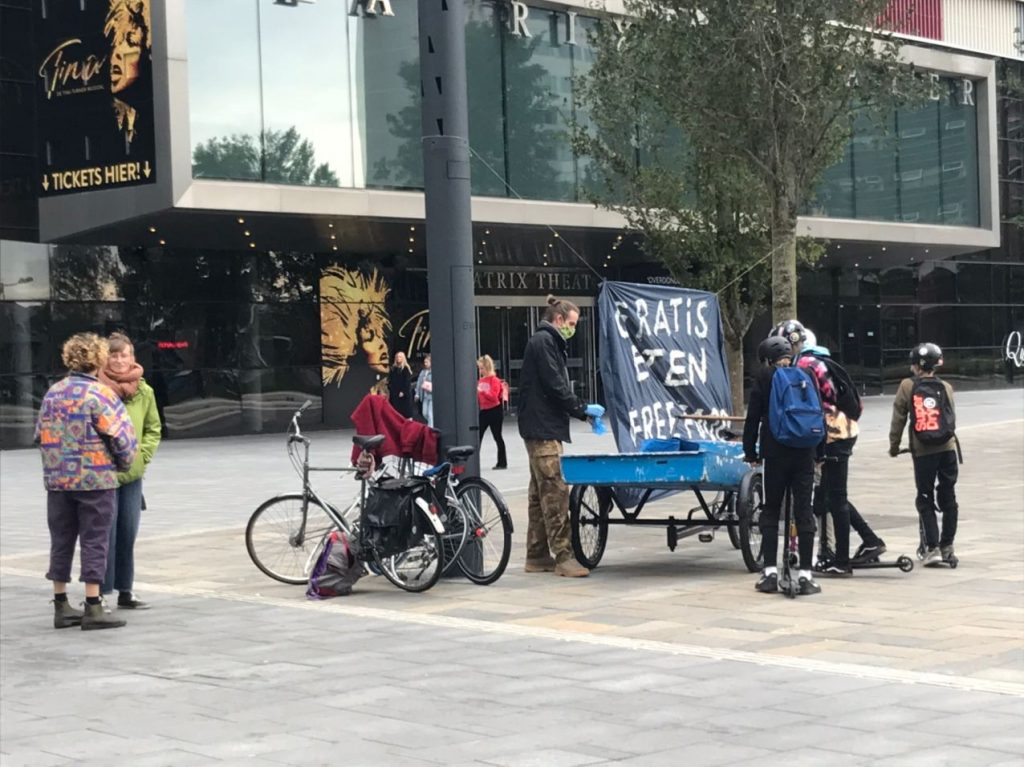
Taste Before You Waste Utrecht’s Mobile Dinner
Giving away food outside though, especially in the current situation, also presents the risk of having to confront with police officers and being more at risk of fines and repercussions. People had different experiences with police so far. Many never confronted with them, to others it happened in September but so far it resolved in nothing more than a chat and the spokesperson having to give their ID.
It was also noted that controls were more likely when going in the city centers rather then in neighbourhoods, and that being mobile was better then being stationary under that regard. Even if having a central point for distribution would definitely be easier, moving around in order not too attract too many people at the same time in the same spot seemed the preferred option for some.
It’s unclear how things will evolve with the new measures, in general there’s a certain confidence that it’s possible to host events while keeping it safe and respecting the measures.
Of course serving food outside also comes with some other issues, like what to do in case of bad weather or how to avoid wasting too many food containers. We shared our experiences on that, in general it seemed that, with some creativity we were finding ways to deal with it.
Being outside of social centers and interacting with people on the street
Despite everything, in general people considered it positive to have been “forced” to operate outside of social centers. This made it possible to intercept people that would maybe not have entered in such a space before, it also helped making us, and what we stand for, visible in the neighbourhood/city. Some really felt that they were strengthening the connection in the neighbourhood, for others it was also important as it gave the possibility of physically confronting certain dynamics, like for example serving rescued food in front of the “green” supermarket chain Ekoplaza for free. Some among us had already done similar things in the past or thought about doing it, but, for a reason or another, never really managed to do it more regularly.
Somebody expressed the importance of such a presence on the outside in order to fight a certain tendency of subculturisation of social centers.
This also confronted some of the groups with the realisation of sometimes operating too much in a certain bubble, and realising, for example, that more material in Dutch is needed, or the differences in how people react to “free food”.
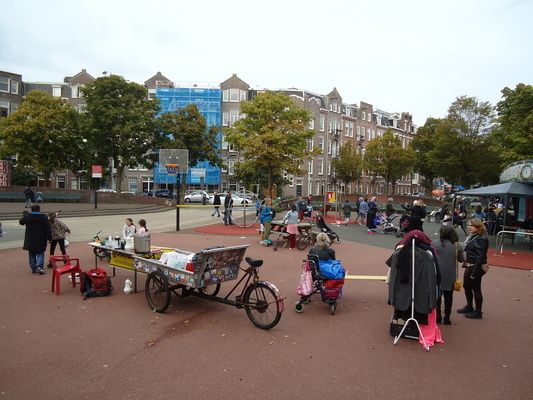
Joe’s Garage at Burendag
The latter problem was something we discussed more in depth. Many among us noticed that, indeed, when being offered free food some people would react saying “There are people that need it more” or “Why don’t you give it to Voedselbank” or even almost offended for being considered a person that would need free food.
Some noticed that of course some of these reactions happened more often in the city centre or in certain neighbourhoods compared to others. Some however, mentioned an episode of a person refusing food the first time but accepting it the one after, and the importance of taking the time so that people can understand what you’re doing and why you’re doing it.
Some also mentioned how they were discussing to re-frame it in maybe a way like “the industrial food production is shit, stop giving them money!” and using the anti-foodwaste narrative as a way to attract people’s attention and then have the space to give it a more general anti-capitalist framing.
Creating a community and relaxing during COVID
We also discussed how people really valued the space they managed to create this summer in parks/squares and how it was important to find a space to relax in the middle of the pandemic, maintaining connections and creating a community.
Charity Framing
We also briefly discussed the whole issue with serving food to people in need and charity framing. It is something on which Redistributie reflected a bit (and it was a topic already discussed before among Barricade people). In general they mentioned the importance of not working as an institution and of being able to build mutual connections with people in the park, and also taking the time to explain why they’re doing it. In the past they even had some people from the park that joined with cooking.
—–
Joe’s Garage (Amsterdam) – https://joesgarage.nl/
Taste Before You Waste Utrecht – https://tbywutrecht.wordpress.com/
RATS (Rotterdam) – https://rotterdamserats.blackblogs.org/
Redistributie (Den Haag) – https://www.facebook.com/Redistributie-Den-Haag-114378917080802
The Barricade (Utrecht) – https://thebarricade.noblogs.org

